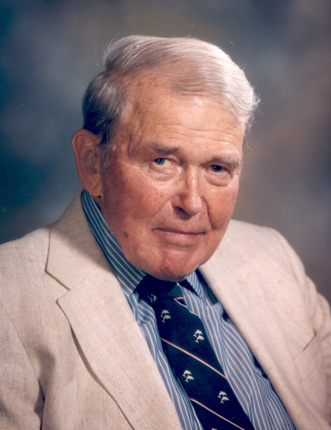
William R. Hewlett (1913–2001) was Co-founder of Hewlett-Packard Company (HP). Hewlett resigned as President in 1977 and retired as Chief Executive Officer in 1978. He then served as Chairman of HP's Executive Committee until 1983, when he became Vice Chairman of the Board of Directors. In 1987, he was named Director Emeritus and he served in that position until his death on Jan. 12, 2001.
Hewlett was born May 20, 1913, in Ann Arbor, Mich. He attended Stanford University in Stanford, Calif., and received a bachelor of arts degree in 1934. He also received a master's degree in electrical engineering from the Massachusetts Institute of Technology in 1936. Additionally, he received the degree of engineer from Stanford University in 1939.
Hewlett met David Packard during their undergraduate days at Stanford. The two engineering classmates became friends and formed a partnership known as Hewlett-Packard Company in 1939. HP's first product was a resistance-capacitance audio oscillator based on a design developed by Hewlett when he was in graduate school. The company's first "plant" was a small garage in Palo Alto, and the initial capital amounted to $538.
Hewlett was involved actively in management of the company until 1987, with the exception of the years he served as an Army officer during World War II. He was on the staff of the Army's Chief Signal Officer and then headed the electronics section of the New Development Division of the War Department Special Staff. During this latter tour of duty, he was on a special U.S. team that inspected Japanese industry immediately after the war.
In 1947, shortly after he returned to Palo Alto, Hewlett was named Vice President of HP. He was elected Executive Vice President in 1957, President in 1964, and also was named Chief Executive Officer in 1969.
Over the years, Hewlett contributed to the advancement of various organizations within the electronics industry. From 1950 to 1957 he was on the board of directors of the Institute of Radio Engineers—now the Institute of Electrical and Electronics Engineers (IEEE)—and served as president of the institute in 1954. He also has played an important role in the development of the former Western Electronic Manufacturers Association, now called the American Electronics Association. In 1983, then-President Ronald Reagan awarded him the National Medal of Science, the nation's highest scientific honor.
Hewlett had a keen interest in education and medicine. He was a trustee of Mills College in Oakland, Calif., from 1958 to 1968 and Stanford University from 1963 to 1974, and was a member of the San Francisco regional panel of the Commission on White House Fellows from 1969 to 1970.
He served as Board President of the Palo Alto-Stanford Hospital Center (now Stanford Medical Center) from 1956 to 1958 and as a Director from 1958-1962. He was a Director of the Kaiser Foundation Hospital and Health Plan from 1972 to 1978, and the Drug Abuse Council in Washington, D.C., from 1972 to 1974.
Hewlett was an Honorary Trustee of the California Academy of Sciences, a Member of the National Academy of Engineering and the National Academy of Sciences and a Fellow of the American Academy of Arts and Sciences. He was also Trustee Emeritus of the Carnegie Institution of Washington.
From 1966 to 1994, he served as Chairman of the William and Flora Hewlett Foundation, which he established with his late wife, Flora. Up until his death, he served as Chairman Emeritus of the Foundation. In 1995, Hewlett supported the founding of the Public Policy Institute of California with an endowment of $70 million. From 1998 to 2001, Hewlett was a Director Emeritus of the Monterey Bay Aquarium Research Institute, after having served as a Director of the Institute for 12 years.
Hewlett held honorary degrees from American colleges and universities: honorary doctor of law degrees from the University of California at Berkeley, Yale University, Mills College, Marquette University and Brown University; honorary doctor of science degrees from Polytechnic Institute of New York and Kenyon College; honorary doctor of engineering degrees from the University of Notre Dame, Dartmouth College and Utah State University; and an honorary doctor of humane letters from Johns Hopkins University.
He also held an honorary doctor of public policy degree from the Rand Graduate Institute and an honorary doctor of humanities degree from Santa Clara University. Internationally, Hewlett held an honorary doctor of electronic science degree from the University of Bologna in Italy.
In October of 1999, Hewlett received the Eta Kappa Nu Association's Eminent Member Award.






